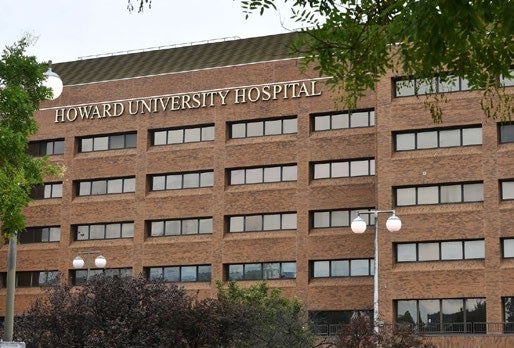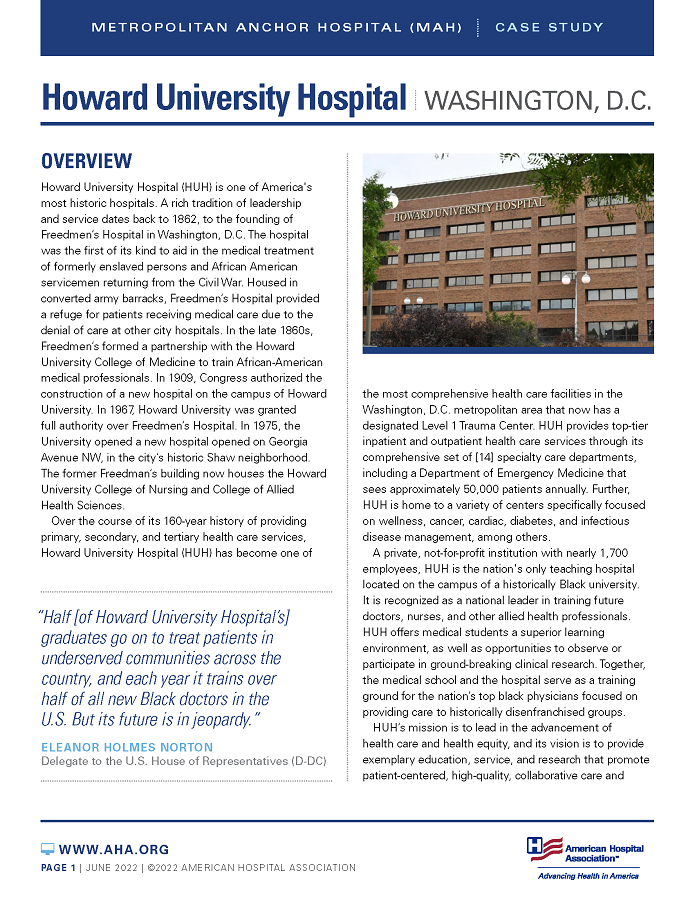

Howard University Hospital | Washington, D.C.
Metropolitan Anchor Hospital (MAH) | Case Study
Overview
 Howard University Hospital (HUH) is one of America's most historic hospitals. A rich tradition of leadership and service dates back to 1862, to the founding of Freedmen’s Hospital in Washington, D.C. The hospital was the first of its kind to aid in the medical treatment of formerly enslaved persons and African American servicemen returning from the Civil War. Housed in converted army barracks, Freedmen’s Hospital provided a refuge for patients receiving medical care due to the denial of care at other city hospitals. In the late 1860s, Freedmen’s formed a partnership with the Howard University College of Medicine to train African-American medical professionals. In 1909, Congress authorized the construction of a new hospital on the campus of Howard University. In 1967, Howard University was granted full authority over Freedmen’s Hospital. In 1975, the University opened a new hospital opened on Georgia Avenue NW, in the city’s historic Shaw neighborhood. The former Freedman’s building now houses the Howard University College of Nursing and College of Allied Health Sciences.
Howard University Hospital (HUH) is one of America's most historic hospitals. A rich tradition of leadership and service dates back to 1862, to the founding of Freedmen’s Hospital in Washington, D.C. The hospital was the first of its kind to aid in the medical treatment of formerly enslaved persons and African American servicemen returning from the Civil War. Housed in converted army barracks, Freedmen’s Hospital provided a refuge for patients receiving medical care due to the denial of care at other city hospitals. In the late 1860s, Freedmen’s formed a partnership with the Howard University College of Medicine to train African-American medical professionals. In 1909, Congress authorized the construction of a new hospital on the campus of Howard University. In 1967, Howard University was granted full authority over Freedmen’s Hospital. In 1975, the University opened a new hospital opened on Georgia Avenue NW, in the city’s historic Shaw neighborhood. The former Freedman’s building now houses the Howard University College of Nursing and College of Allied Health Sciences.
Over the course of its 160-year history of providing primary, secondary, and tertiary health care services, Howard University Hospital (HUH) has become one of the most comprehensive health care facilities in the Washington, D.C. metropolitan area that now has a designated Level 1 Trauma Center. HUH provides top-tier inpatient and outpatient health care services through its comprehensive set of [14] specialty care departments, including a Department of Emergency Medicine that sees approximately 50,000 patients annually. Further, HUH is home to a variety of centers specifically focused on wellness, cancer, cardiac, diabetes, and infectious disease management, among others.
A private, not-for-profit institution with nearly 1,700 employees, HUH is the nation's only teaching hospital located on the campus of a historically Black university. It is recognized as a national leader in training future doctors, nurses, and other allied health professionals. HUH offers medical students a superior learning environment, as well as opportunities to observe or participate in ground-breaking clinical research. Together, the medical school and the hospital serve as a training ground for the nation’s top black physicians focused on providing care to historically disenfranchised groups.
HUH’s mission is to lead in the advancement of health care and health equity, and its vision is to provide exemplary education, service, and research that promote patient-centered, high-quality, collaborative care and advocate for the elimination of health disparities. The hospital must have greater financial stability to invest in the resources necessary to meet its patients’ needs.
“Half [of Howard University Hospital’s] graduates go on to treat patients in underserved communities across the country, and each year it trains over half of all new Black doctors in the U.S. But its future is in jeopardy.”
Eleanor Holmes Norton
Delegate to the U.S. House of Representatives (D-DC)
Patient–Payer Mix
Most patients entering the HUH system are covered by public programs, with 86% of visits coming from patients who qualify for Medicare, Medicaid, or local public programs. Respectively, Medicaid and Medicare revenue represents 83% of total net patient revenue and more than 76% of patient discharges. A small number of HUH patients have private, commercial insurance. Further, HUH provides more than $11.5 million in uncompensated care annually to support its promise of caring for patients regardless of their insurance status.
HUH's Commitment to the Community
Since the hospital’s inception, advancing health equity has been central to HUH’s mission. HUH sponsors numerous programs and initiatives to promote overall wellness and educate individuals on their health care needs and options to ultimately improve the overall health of the community:
Faith-Based Partnerships
By partnering with religious communities across the area, HUH is able to connect with individuals in a place they trust. These efforts are enabling HUH to improve individuals’ access to care before they are faced with a health care crisis, including much-needed mental and behavioral care.
Emphasis on Prenatal Care
Leadership at HUH has identified maternal health as a key area of focus. HUH’s diverse clinical faculty are dedicated to helping expectant mothers with lower family incomes overcome barriers in accessing maternal health care. Too often expectant mothers in the DC area struggle with prioritizing their prenatal care as they face challenges with managing employment, caring for their families, and struggling with lack of transportation. These barriers can result in greater risk for mothers and babies of birth in crisis; therefore, HUH has invested in a higher level NICU and has embraced a number of programs to improve access to prenatal care for expectant mothers, including birthing classes, nutritional education, and support wellness check adherence.
Nutrition Education
HUH recently participated with an online cooking show to educate individuals in the community on how to prepare nutritious and healthy meals on a budget. The goal is to help educate families to eat more healthfully while keeping grocery costs low. This program was launched to reach families and individuals who live in DC’s Ward 7 and Ward 8 who face sustained hardship.
Metropolitan Anchor Hospitals Need Support
HUH has a long and trusted history of providing consistent, quality care to individuals across the Washington, DC area, but financial resources are needed to make needed capital investments, including medical equipment upgrades to treatment for stroke victims and those with cardiac disease. Upgrades are needed to support a health information system for better patient data collection and the adoption of electronic health care solutions. In addition, more investment is needed to improve and maintain the hospital system’s existing infrastructure.
As faithful stewards of their mission, the team at HUH is dedicated to never turning away a single person in need. Adequate, sustained federal support is critical to making this possible.


